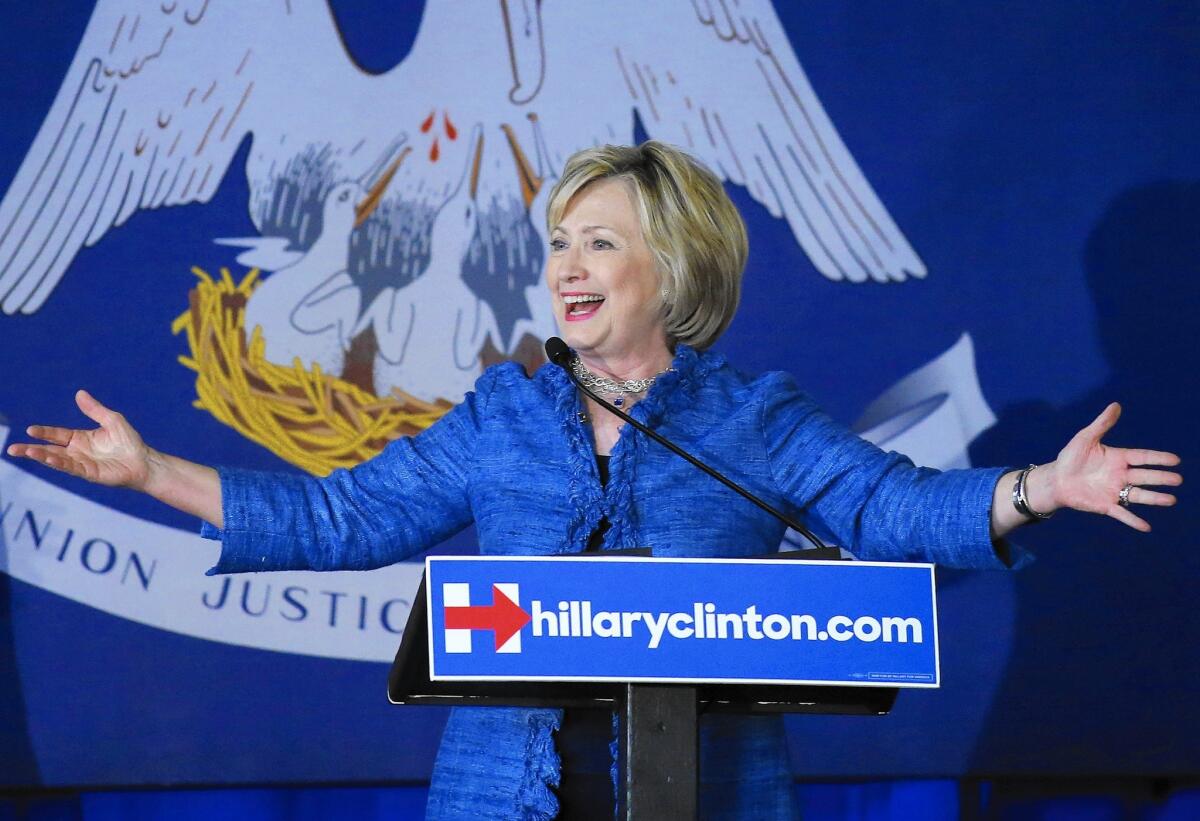Hillary Clinton previews plan to expand Obamacare and lower health costs

- Share via
Reporting from LITTLE ROCK, Ark. — Democrats facing tough elections have been running away from Obamacare in their campaigns almost since the law was passed, but Hillary Rodham Clinton is taking a different approach. She is embracing it.
On the campaign trail, Clinton is leaning into the Affordable Care Act, touting the health insurance mandate as a signature achievement of Democrats as the law — about which the public remains deeply divided — has become firmly embedded in the nation’s healthcare system and is delivering sweeping new benefits to millions of voters.
On Tuesday, Clinton will unveil a plan to expand the law’s reach with a proposal to force down the prices of prescription drugs. She will call for new federal rules to cap what consumers are forced to pay out of pocket for medicines, and she would allow the federal government to negotiate directly with drug makers to secure lower drug costs for seniors on Medicare.
“I want to do more to bring down the costs for families,” Clinton said at a rally here, where she previewed the plan. “It is disgraceful.... Medications for a lot of diseases are going up to thousands of dollars a month.”
SIGN UP for the free Essential Politics newsletter >>
The plan would allow Americans to buy prescription drugs abroad, where prices are often lower; prohibit drug companies from writing off the cost of advertising; and limit profits the companies can make from drugs developed with the help of federal research subsidies. It would also boost spending at the Food and Drug Administration so prescription drugs could be approved for sale more quickly.
Prescription drugs account for just 10% of the nation’s healthcare spending, but rising prices and the proliferation of headline-grabbing specialty medications that cost tens of thousands of dollars, such as the hepatitis C drug Sovaldi, are driving public anxiety.
Clinton’s embrace of Obamacare as a potential boon to Democrats at the polls next year is a notable contrast from Democratic strategy in previous elections. Congressional candidates in the 2010 and 2014 midterms sidestepped the issue whenever possible. Even Obama largely kept his campaign spotlight off healthcare during his race for reelection, with the exception of the campaign’s Latino strategy, which heavily promoted the law’s promise in Spanish-language advertising.
But now more than 9 million Americans have gained health insurance through Medicaid or private insurance marketplaces created by the Affordable Care Act. The nation’s uninsured rate has fallen more rapidly than at any time in at least half a century, a point Clinton seized on in Little Rock and at a campaign event earlier Monday in Baton Rouge, La., as she noted that every GOP candidate wants to repeal the law.
“I’m not going to let them tear up that law, kick 16 million people off their health coverage and force this country to start the healthcare debate all over again,” Clinton said in Baton Rouge. “Not on my watch.”
“Why would you repeal something that is working to help people?” she said.
Clinton was particularly critical of Republican governors who spurned federal dollars to expand their Medicaid programs, a key provision of Obamacare. In Baton Rouge, she called out by name Gov. Bobby Jindal, himself a presidential candidate, for refusing the subsidies, charging that it left 190,000 people in the state without insurance. Jindal responded by challenging Clinton to a debate on the issue.
“Obamacare was sold to the American people based on lies that it would improve quality and lower costs,” he said in a statement. “It has done none of that.”
The Medicaid issue will probably play prominently next year in the crucial election battleground state of Florida, which has also rejected federal subsidies intended to bring coverage to large numbers of low-income residents without insurance. Jeb Bush, a GOP heavyweight in the presidential race and a former Florida governor, urged lawmakers to reject the subsidies.
NEWSLETTER: Get the day’s top headlines from Times Editor Davan Maharaj >>
Clinton chose Arkansas and Louisiana on Monday to begin focusing on healthcare because of the vastly different experiences the two states have had with the law. In Arkansas, which has embraced Obamacare, the uninsured rate has plummeted from 22.5% in 2013 to 9.1% in the first half of 2015, the largest decline of any state, according to Gallup surveys.
By contrast, Louisiana has seen its uninsured rate decline less than half as much, falling from 21.7% to 16.3%. The state’s health indicators — including life expectancy — are among the worst in the nation.
While Republicans continue to call for repealing the law, only a handful of GOP candidates have offered a blueprint for what their replacement would look like. And even those who have, including Wisconsin Gov. Scott Walker — who dropped out of the race Monday — have not detailed how they would pay for a replacement.
Levey reported from Little Rock and Halper from Washington.
ALSO
Abuse victims say Catholic Church must do more to atone for predatory priests
Scott Walker ends campaign for president -- the second Republican to drop out
Fiorina seizes the moment after poll shows her in second place in GOP race
More to Read
Sign up for Essential California
The most important California stories and recommendations in your inbox every morning.
You may occasionally receive promotional content from the Los Angeles Times.











